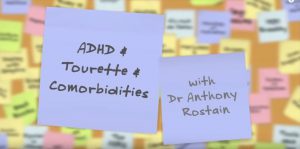ADHD Tourette
ADHD Comorbidities
Dr. Anthony Rostain of the University of Pennsylvania talks about the overlap between ADHD and Tourette syndrome. And despite the clichés, Tourette Syndrome often shows up as subtle tics, throat clearing, hair touching, or other mild ‘quirks’. Tony explains how it feels to have Tourette and why it’s so challenging.
For more ADHD information see:
TRANSCRIPT
ADHD & Tourette & Comorbidities
We started the first ADHD program in Philadelphia in 1987 and about for the first five six years I saw every single patient that came through I was like the psychiatric consultant, but little by little I individuated into the role of seeing the ones who had problems with tics and Tourette’s. The ones who were highly anxious the ones who seemed explosive and had real rages and mood disorders, and then the ones who had the learning disabilities that were really impairing their ability especially to relate socially, and so little by little we began to sort of separate what we each did on the team and then eventually I teamed up with a neurologist and the two of us really focused on the neuropsychiatric aspects of these various forms of developmental disorder.
Almost anybody and everybody I see now has at least has ADHD with something else and, I was it’s a time that the first papers came out on comorbidity we didn’t like the word comorbidity it sounded too morbid but what it really was speaking to was complexity and how the brain and the mind works when you’re not only having trouble focusing and organizing your life but you’re also having tremendous anxiety about you know how you’re going to succeed in either academics or social situations or when you’re having problems understanding social cues or when your tics are bothering you and you can’t sit still and you’re really suppressing and you’re spending all your energy trying to suppress these tics.
It’s about a little bit under 1% and chronic tic disorders higher than that and so they make up actually interesting is that about 20% of people with ADHD have had tics at some point and in the treated samples anyway we see it easily easily in my in my in my practice here easily a third of them have had at some point tics or chronic motor tics or vocal tics during their younger lives.
Now the best example I can give is that for the actual tick phenomenon if people don’t know what it’s like is imagine suppressing a sneeze and trying to you feel the sneeze coming on and you want to stop but you don’t want to sneeze but you can’t and then you finally sneeze and then you feel better but all that time that you were suppressing the sneeze you can’t pay attention to what what’s going on around you you’ve, diverted all your attention inwardly.
The other interesting phenomenon is that so that’s another cause of distractability in people with this type of tendency. The other is what I call the sticky brain that when you get an image in there like we’ve all catch a song in our heads that we like and will sing the song it’ll pop in there you may sing it once or twice maybe if you really like it you’ll keep singing it for maybe a minute or two, but my patients tell me that the song keeps coming back over and over and over and over and they want to turn it off and it won’t turn off. So the song will come back or the image of a say something they saw and that frightened them or even an imaginary scenario.
If I give the medication to help they’re focusing like a stimulant they begin at times not all of them tend to to feel that they have a greater sense of control, and so in the old days when we first started never never would we give a child with tics a stimulant because oh you’re gonna make their tips worse then it turns out that only 30% of the time it’s that true and 70% of the time either they don’t get worse or they get better. So what we’re trying to do now is really cut down, we’ve gone away from treating the tics unless they’re life-threatening or severely impairing and now we focus a lot more on treating the attentional problems, treating the anxiety and the obsessional tendencies and treating some of the rage and mood mood disorder problems that we see.
View related videos
View related blog posts


Leave A Comment
You must be logged in to post a comment.